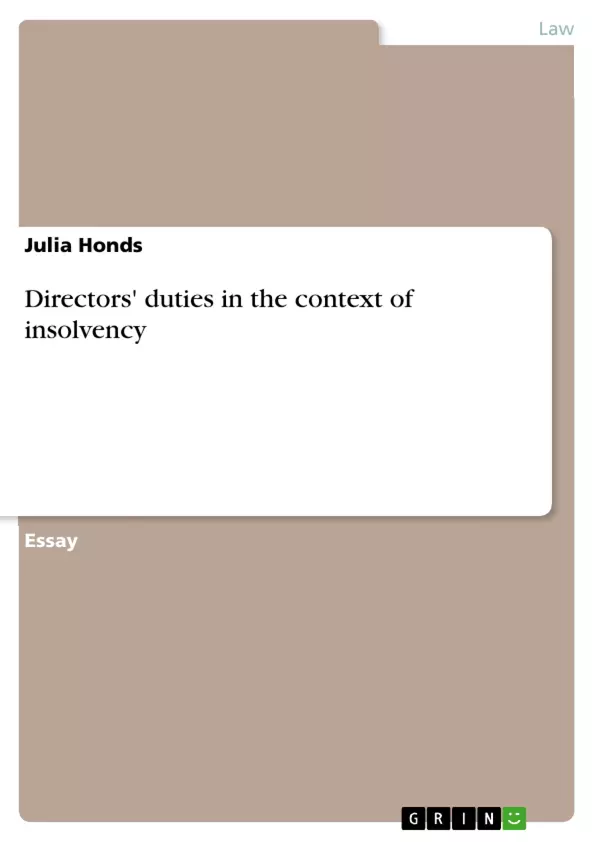This essay deals with directors’ duties, focusing on the duties that specially arise in the context of a company becoming insolvent. The relevant duties are those under sections 131, 135 and 136 of the Companies Act 1993. The drafting of these insolvent trading provisions in New Zealand has been criticised in the legal literature. This research paper considers not only this criticism but also deals with the more general debate about the value of insolvent trading provisions in general. Although the current drafting of the relevant provisions in New Zealand is not without minor flaws, the need for creditor protection requires the maintenance of insolvent trading provisions in general. Besides that, this essay looks at the remedies for breaches of directors’ duties. The most important provision in this context is s 301 Companies Act 1993. Pursuant to this provision both the liquidator and individual creditors can enforce directors’ civil liability. However, the possibilities of individual creditors to obtain payment directly to themselves are restricted. The final part of this essay considers the question whether a separate duty directly owed to individual creditors should be introduced. Although such a duty seems to have some benefits, it would not be commensurate with leading principles and ideas of Insolvency Law and should therefore not be introduced.
It is the concern of this research paper to point out the many issues that arise in context of directors’ duties and insolvency law and to show that it is important to strike an appropriate balance between the intended creditor protection and the entrepreneurial freedom of company directors.
Inhaltsverzeichnis (Table of Contents)
- INTRODUCTION
- DEFINITION OF “DIRECTOR”?
- THE CONTENTS OF DIRECTORS' DUTIES
- Directors' Duties in General.
- Change of Directors' Duties In or Near Insolvency
- Reckless Trading (s 135 CA)
- The Duty in Relation to Obligations (s 136 CA)
- The Duty to Act in the Company's Best Interest (s 131 CA)
- Solvency Test
- Tort of “Deepening Insolvency”
- Ratification of Breach of Duty
- Evaluation of Insolvent Trading Provisions in General
- THE DIRECTOR'S CIVIL LIABILITY – ENFORCEMENT OF DIRECTORS' DUTIES
- Enforcement of Directors' Duties in General
- Enforcement of Directors' Duties in Course of Liquidation
- SEPARATE DUTIES DIRECTLY OWED TO CREDITORS?
- CONCLUSION
Zielsetzung und Themenschwerpunkte (Objectives and Key Themes)
This research paper examines directors' duties, particularly those arising when a company becomes insolvent, focusing on sections 131, 135, and 136 of the Companies Act 1993 (CA). It explores the criticism surrounding the drafting of these provisions in New Zealand and the broader debate regarding the value of insolvent trading provisions. The paper also delves into the remedies available for breaches of directors' duties, focusing on the enforcement mechanism provided by s 301 CA, and ultimately argues for the continued importance of insolvent trading provisions despite potential flaws.
- Directors' duties in the context of insolvency
- The effectiveness and criticism of insolvent trading provisions
- The balance between creditor protection and entrepreneurial freedom
- The enforcement of directors' civil liability
- The potential for separate duties owed to creditors
Zusammenfassung der Kapitel (Chapter Summaries)
The Introduction sets the stage by explaining the significance of directors' duties in guiding corporate decision-making, particularly in the context of insolvency. It highlights the need to balance creditor protection with the freedom of company directors to pursue business objectives. The paper then outlines its scope, focusing on the duties outlined in sections 131, 135, and 136 of the CA.
The chapter on "The Contents of Directors' Duties" begins with a general overview of directors' responsibilities, followed by a detailed examination of the specific duties relevant to insolvency. This includes an analysis of the "reckless trading" provision (s 135 CA), the duty in relation to obligations (s 136 CA), and the duty to act in the company's best interest (s 131 CA). The chapter further explores the "solvency test," the "tort of deepening insolvency," and the implications of breaching these duties, including ratification and the overall evaluation of insolvent trading provisions.
The chapter on "The Director's Civil Liability" explores the enforcement mechanisms available for breaches of directors' duties, including the remedies available in general and specifically during liquidation under s 301 CA. This section also examines the role of individual creditors in enforcing these duties.
The final section, "Separate Duties Directly Owed to Creditors," considers the potential benefits and drawbacks of introducing a separate duty owed directly to creditors. This section explores arguments both for and against such a duty, analyzing its potential impact on existing legal principles and the broader landscape of insolvency law.
Schlüsselwörter (Keywords)
Directors' duties, insolvency, Companies Act 1993, insolvent trading, creditor protection, entrepreneurial freedom, civil liability, enforcement, remedies, liquidator, individual creditors, separate duty.
Frequently Asked Questions
What are the primary duties of a director during insolvency?
In New Zealand, directors must adhere to sections 131 (duty to act in best interest), 135 (reckless trading), and 136 (duty regarding obligations) of the Companies Act 1993.
What is "reckless trading" under s 135 CA?
It prohibits directors from causing or allowing the business of the company to be carried on in a manner likely to create a substantial risk of serious loss to the company's creditors.
Can individual creditors sue directors directly?
While s 301 allows creditors to enforce liability, the essay explains that their ability to obtain direct payments to themselves is generally restricted to maintain fairness in liquidation.
What is the "solvency test"?
It is a legal requirement to ensure a company can pay its debts as they become due and that its assets exceed its liabilities before making certain financial decisions.
Should directors owe a separate duty directly to creditors?
The research paper argues against this, as it might conflict with established principles of insolvency law and hinder entrepreneurial freedom.
- Quote paper
- Julia Honds (Author), 2006, Directors' duties in the context of insolvency, Munich, GRIN Verlag, https://www.grin.com/document/80625



